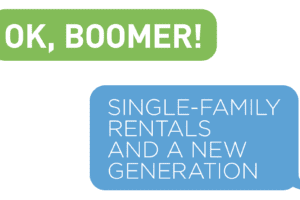AFIRE News

The demographic transition from baby boomers to millennials spells increased demand for single-family rentals in the coming decades. Supply needs to keep up.

COVID-19 and logistics: What have we learned so far, and what will be the lasting impact on the sector as it faces a new stay-at-home economy?

Though mixed-use developments aren’t immune to COVID-19-related disruptions, demand is likely to grow as the crisis subsides.

Understanding new changes in tenant demand, economics, and public health will be critical to the future of commercial real estate investing.

COVID-19 and logistics: What have we learned so far, and what will be the lasting impact on the sector as it faces a new stay-at-home economy?

The asset management function is always integral to long-term value creation in real estate, but the COVID-19 crisis has served as a fresh reminder of just how crucial this role is for navigating challenging conditions.

Understanding new changes in tenant demand, economics, and public health will be critical to the future of commercial real estate investing.

The global health pandemic has turned office use on its head—so what does this mean for the future of the sector?

The economic impact of COVID-19 will not be felt equally across the US. Which metros are well-positioned for life after coronavirus (and why)? Jayanth Ganesan of Nuveen Real Estate weighs in.

US real estate retains its foreign investment appeal, though transaction volumes are down and regulatory scrutiny is on the rise—especially as action heats up around CFIUS.

Asset management has always been integral to long-term value creation for real estate, and during crises, it can also guide how to navigate challenging conditions.

What responsibility do institutional investors in real estate have to cities, communities, and stakeholders during a time of global change?

The economic impact of COVID-19 won’t be felt equally across the US. Which cities are well-positioned for life after the pandemic (and why)?

With emerging crises and uncertainties in economies, foreign relations, and social attitudes, the real estate industry is facing a paradigm shift of its own.

The year of COVID-19 has been rife with anxiety and unrest—nothing new for real estate, but what does it mean for the future of the industry?

This episode of the AFIRE Podcast features Maggie Coleman of JLL, who offers a comprehensive view of the global real estate investment outlook through 2020.

States in the US find creative ways to make up lost revenues, CFIUS gains increased powers of scrutiny, and US lawmakers debate follow-up legislation to the CARES Act.

Typically, institutional investment is attracted to sure and stable assets—so what should institutional investors do during a time of economic and social change?

Knowing when to speak and when to listen is more important than ever—and could make the difference between success today or failure tomorrow.

The office isn’t dead, but after COVID-19, it’s going to be forever changed. Peter Grey-Wolf, Vice President for WealthCap, has some ideas for where the office is going next.
